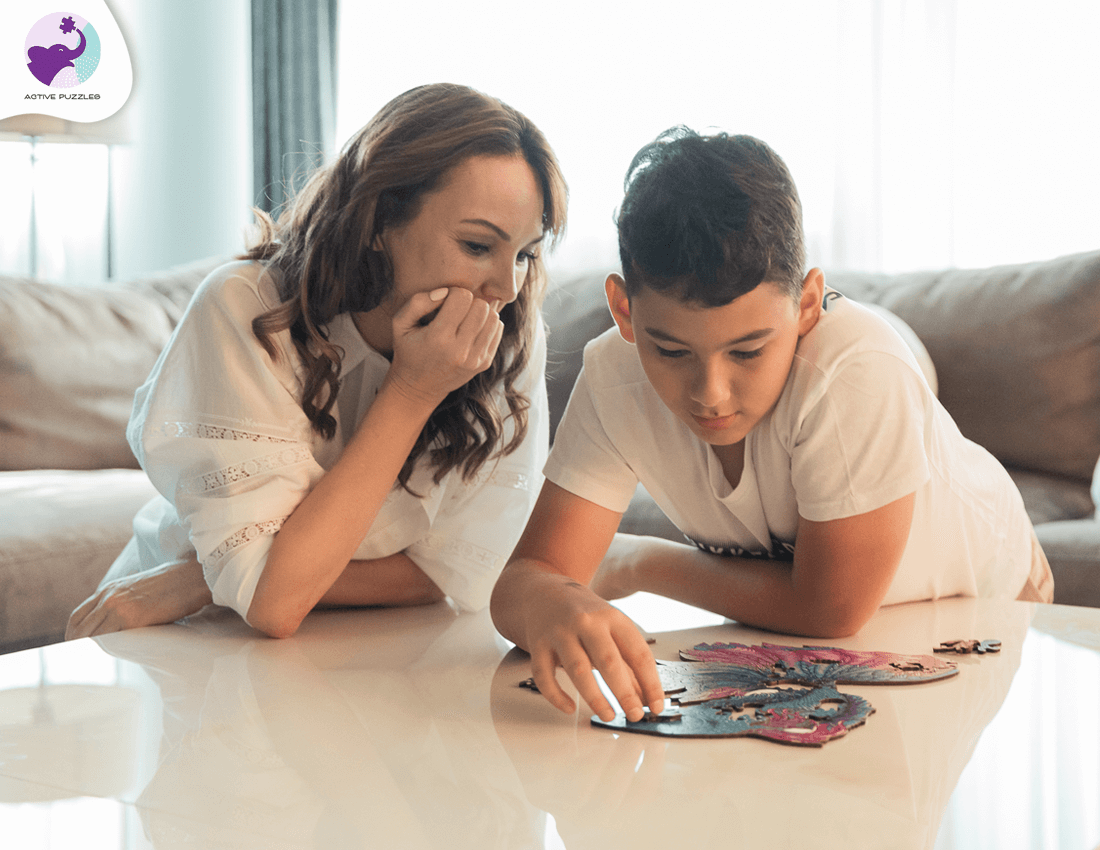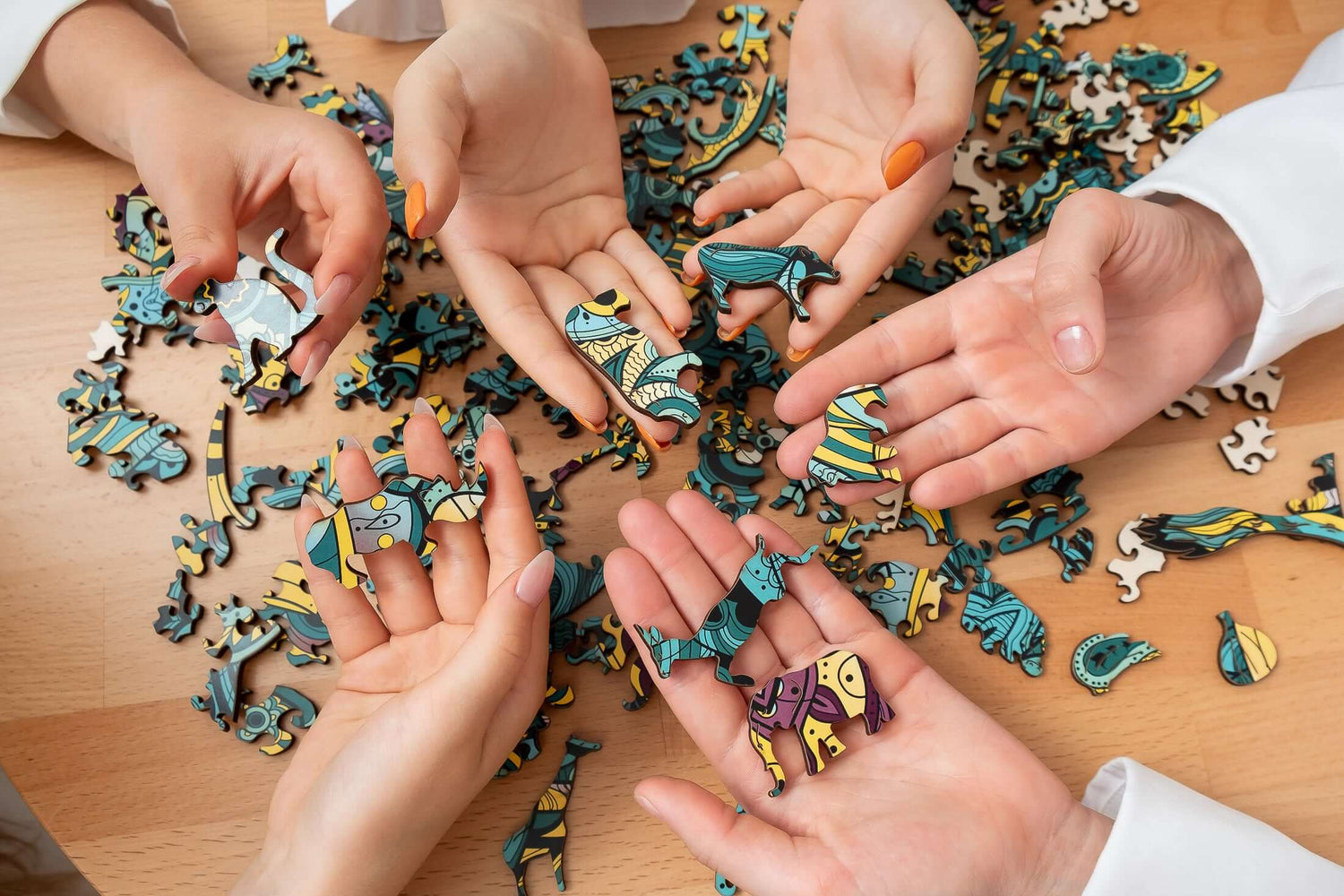
Social Benefits of Jigsaw Puzzles for Building Communication and Teamwork Skills
Share
Is there something missing from your social life? You may have trouble expressing yourself clearly or finding common ground with others, making it challenging to achieve your goals.
If this describes you, you might be shocked to realize that jigsaw puzzles provide the solution you've sought. Jigsaw puzzles aren't only a relaxing pastime and a great way to hone communicative abilities that will serve you well in any setting.
The Social Benefits of Jigsaw Puzzles:-
-
Enhancing Communication Skills:
Puzzle games for employees can help people enhance their communication skills because they demand conversation and collaboration to complete. When solving a puzzle as a group, members must talk to each other and share their thoughts to ensure everything fits together correctly.
As a result, individuals can improve their communication skills in a wide range of contexts and learn to understand better and respond to the viewpoints of others. Professionals can apply the abilities they acquire through puzzle-solving, for instance, to improve their ability to communicate and work together on a collaborative project.
-
Building Teamwork Skills:
Teamwork is required to finish a jigsaw puzzle since each piece is crucial to the whole. Puzzle-solving is a great way to build teamwork abilities that can be applied in other contexts, such as the office or the sports field.
Learning to cooperate effectively, recognize one another's contributions, and rely on one another are all skills that may be honed via shared effort. Group puzzle games can potentially improve team dynamics and lead to greater efficiency.
-
Fostering Patience and Perseverance:
Completing a jigsaw puzzle takes time and persistence because it can take multiple tries to find the perfect piece. Resilience and perseverance are skills that can serve people well in various contexts, and they can be refined by learning to be patient and not give up when presented with a problem. Students who develop these attributes through puzzle-solving may be more inclined to continue in challenging coursework.
-
Encouraging Socialization:
Socializing over team building puzzles may be a lot of fun, and it can be a great way to get to know people and strengthen bonds. Those with difficulty with social connections might benefit greatly from the teamwork and conversational opportunities that arise while working on a puzzle together.
Puzzle-solving is a great example of a shared activity that can help people with social anxiety feel more comfortable interacting with others.
-
Stimulating the Brain:
Playing jigsaw puzzles requires focused attention, problem-solving, and spatial awareness, all of which have been shown to improve mental acuity and well-being. Memory, concentration, and analytical thinking are all strengthened with this mental exercise, making it useful for people of all ages.
In addition, many people find that working on a puzzle is a great way to unwind and calm down. Thus, this has the potential to boost psychological and physical wellness.
-
Encouraging Multigenerational Interaction:
Group puzzles, including jigsaws, may be an excellent opportunity for people of all ages to come together and share a common interest. When completing a puzzle with loved ones of varying ages, it's easy to put aside any differences in perspective and focus instead on having fun together. Through this sort of engagement, family and community ties can be fortified, and overall social cohesion can be improved.
Different Ways to Use Jigsaw Puzzles for Building Communication and Teamwork Skills:-
-
Collaborative Puzzle Solving Sessions:
Activities, where participants work together to solve a problem have improved team cohesion and interpersonal communication. Teamwork is emphasized as individuals attempt to address a common problem. They can buy it from the Jigsaw Puzzle Store and complete the puzzle using a variety of approaches by talking it over and learning from one another's insights.
-
Time-Based Puzzle Challenges:
Building collaborative and communicative skills through time-sensitive puzzle team building activity challenges may be fun. In this approach, players are given limited time to solve the puzzle. They must collaborate and share ideas to solve the challenge quickly and effectively.
Team members can learn to communicate more effectively through this technique, which can be especially useful when time is of the essence, and the team must work quickly to finish the challenge.
-
Blind Puzzle Building:
Building puzzles while blindfolded is another novel method that can be used to improve interpersonal communication and group dynamics. In this strategy, everyone except one team member is kept in the dark about the nature of the puzzle.
When only one person in a group can see the puzzle pieces, everyone else must follow their lead. Team members learn to rely on one another and work together to solve problems using this method, which helps foster trust, communication, and cooperation.
-
Puzzle Races:
Games like puzzle races are fantastic for encouraging healthy competition and fostering teamwork at the same time. Several teams race against the clock to see who can solve the puzzle the quickest.
They need to collaborate and share ideas to solve the challenge quickly and effectively. Team members are motivated to work together to defeat the opposing teams because of this strategy's emphasis on collaboration.
-
Randomized Puzzle Pieces:
With this approach, teams must coordinate their efforts to appropriately arrange the puzzle pieces after they have been randomly distributed. This strategy promotes open lines of communication and cooperative problem-solving among team members. It's also a great way to hone your analytical and deductive reasoning skills.
-
Jigsaw Puzzle Relay:
Jigsaw puzzle relays are a fun and effective way to get people moving and working together. Players in this scenario must collaborate during a puzzle-based relay competition.
Taking turns, team members run to the puzzle table, search for a matching piece, and then run back to the group to relay the baton. This methodology emphasizes ongoing discussion, collaboration, and physical exertion.
Conclusion
When people work together to solve a challenge, they learn more about each other's capabilities and limitations, improve their communication ability, and strengthen their bonds. There's no harm in trying, right? Get together with several pals or coworkers and assemble a puzzle to explore how this easy activity might help you break through your social barriers.
